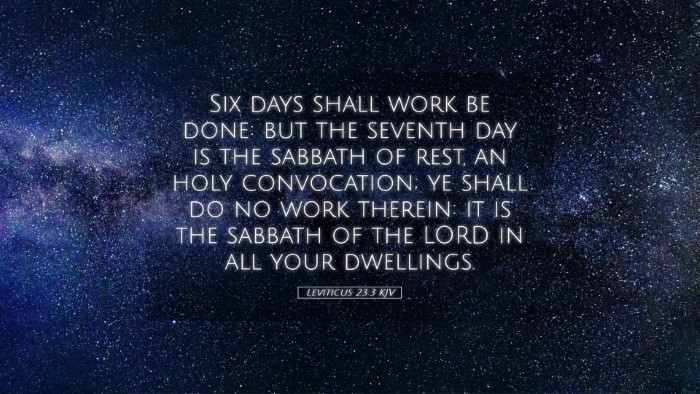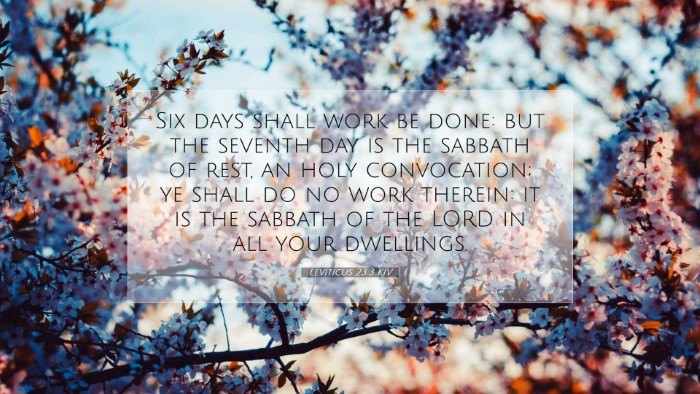Commentary on Leviticus 23:3
Verse: “Six days shall work be done: but on the seventh day is the sabbath of rest, an holy convocation; ye shall do no work therein: it is the sabbath of the LORD in all your dwellings.”
Introduction
The context of Leviticus 23:3 forms part of God’s instruction to Israel concerning sacred times, particularly the observance of the Sabbath. This verse underscores the significance of the Sabbath within Israel's religious practices and highlights the necessity for rest as instituted by God. The implications extend beyond mere cessation of work; they encompass a profound spiritual and communal dimension.
Theological Significance
In reflecting on the theological implications, we recognize that the Sabbath serves as a reminder of creation, rest, and redemption. As Matthew Henry observes, the Sabbath was appointed as a day of rest to commemorate God's own rest after creation. This distinction emphasizes the interplay between divine activity and rest, encouraging humanity to model their work and worship accordingly.
Creation and the Sabbath
According to Albert Barnes, the Sabbath reflects the rhythm established at creation. God's rest on the seventh day (Genesis 2:2-3) is not indicative of fatigue but signifies the completion and perfection of His creative work. The observance of the Sabbath invites believers to pause and recognize the goodness of creation, which is vital for spiritual well-being.
Rest as Divine Mandate
Adam Clarke emphasizes that the Sabbath is not merely a suggestion but a divine ordinance established for humanity’s benefit. The command to “do no work therein” serves as a clear demarcation between sacred and secular time. It encourages believers to set aside their daily labor to focus on God and community, facilitating spiritual rejuvenation and reflection.
Practical Application of the Sabbath
The verse calls for a “holy convocation,” highlighting that the Sabbath is not only a day of individual rest but also a time for communal worship. Matthew Henry remarks that gathering together for worship reinforces community ties and corporate spiritual responsibility. This principle is foundational for the church today, where congregational gathering fuels both personal and communal faith journey.
Benefits of Observing the Sabbath
- Spiritual Renewal: The rhythm of rest and worship rejuvenates the spirit, aligning believers with God’s divine purpose.
- Community Building: Collective worship fosters unity, as shared experiences deepen bonds among congregants.
- Cultural Witness: Observing the Sabbath in a contemporary context serves as a witness to God’s provision and the importance of spiritual health amidst a culture of busyness.
The Modern Context of Sabbath Observance
In light of the increased pace of modern life, applying principles from Leviticus 23:3 becomes invaluable. Albert Barnes calls Christians today to rediscover the importance of dedicated times for spiritual reflection, family bonding, and community connection. The practice of Sabbath, though it may manifest uniquely in varied traditions, must remain rooted in its spiritual essence.
Challenges and Opportunities
The lack of Sabbath observance observed in contemporary society presents both challenges and opportunities. Many believers struggle to prioritize rest amidst relentless societal expectations. Yet, this presents an opportunity for the church to advocate for and teach the importance of observation of the Sabbath as a divine gift of rest.
Conclusion
Leviticus 23:3 serves not only as a historical command but as an enduring principle of spiritual health for both individuals and communities. As we embrace the Sabbath, we acknowledge God as our Creator and Sustainer. The call to rest is a call to restoration—not merely for the body but for the soul. Embracing this holy rhythm can lead to transformative experiences within both personal and collective faith journeys.


